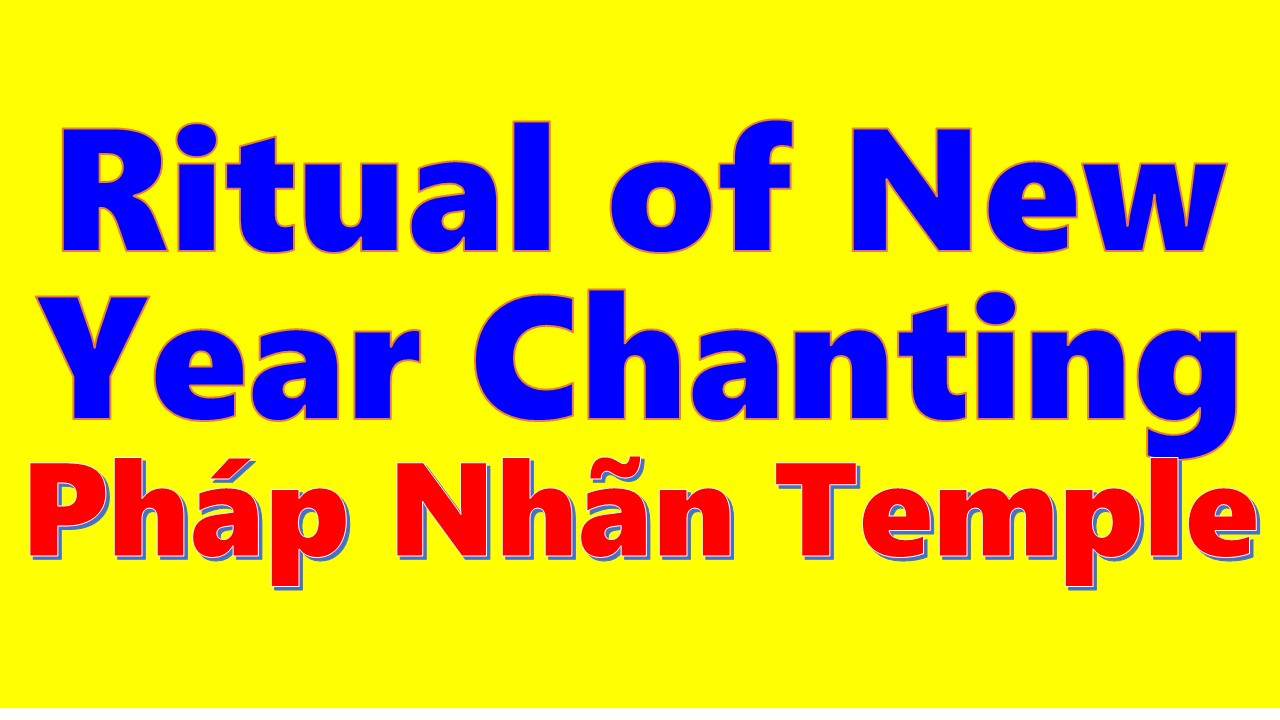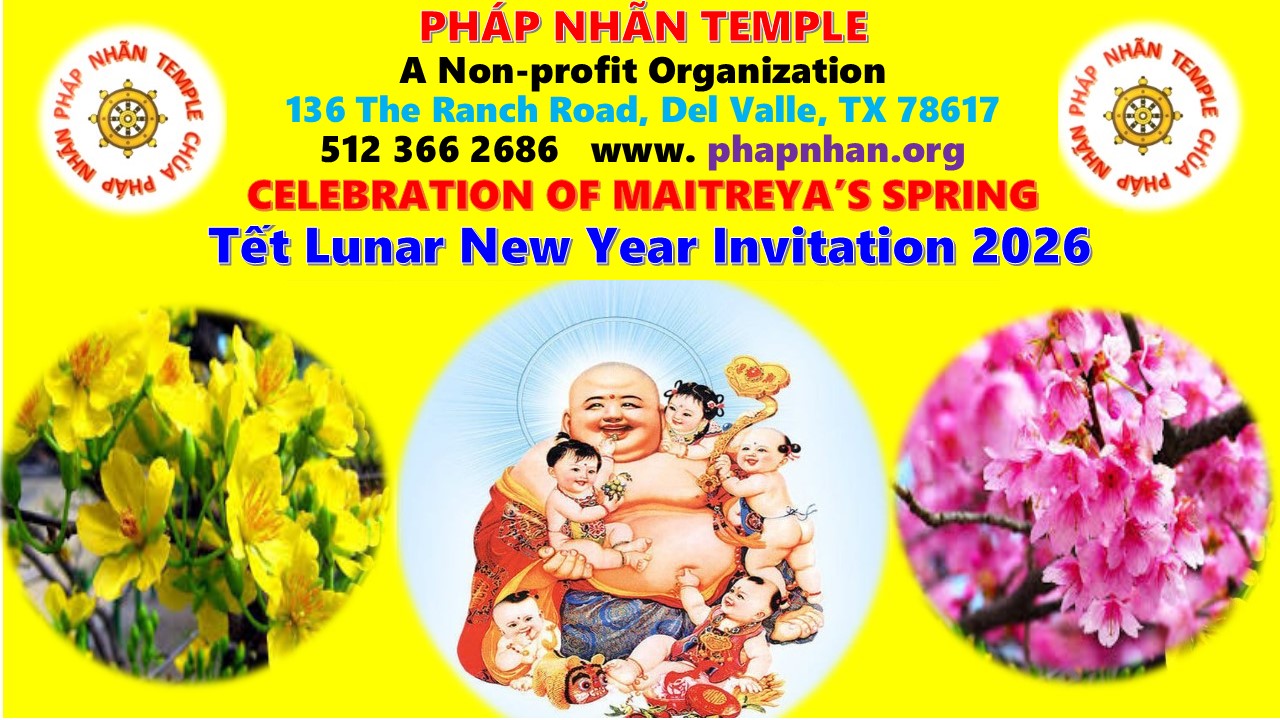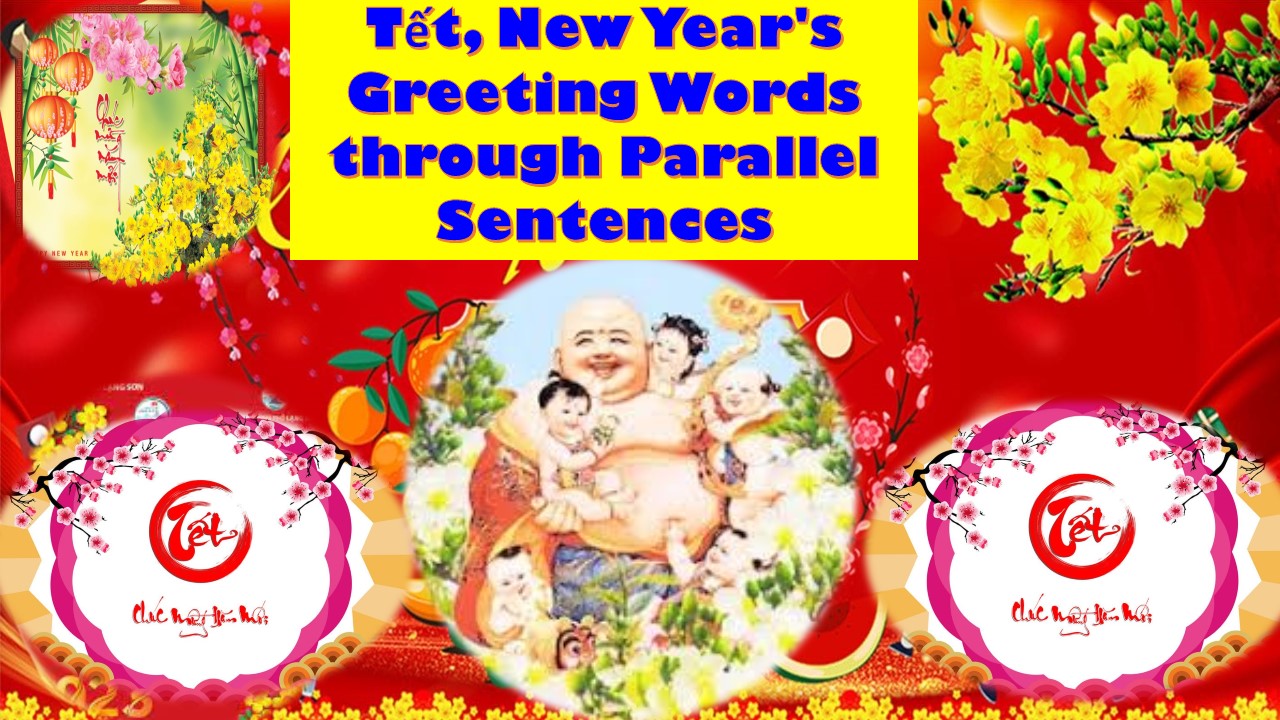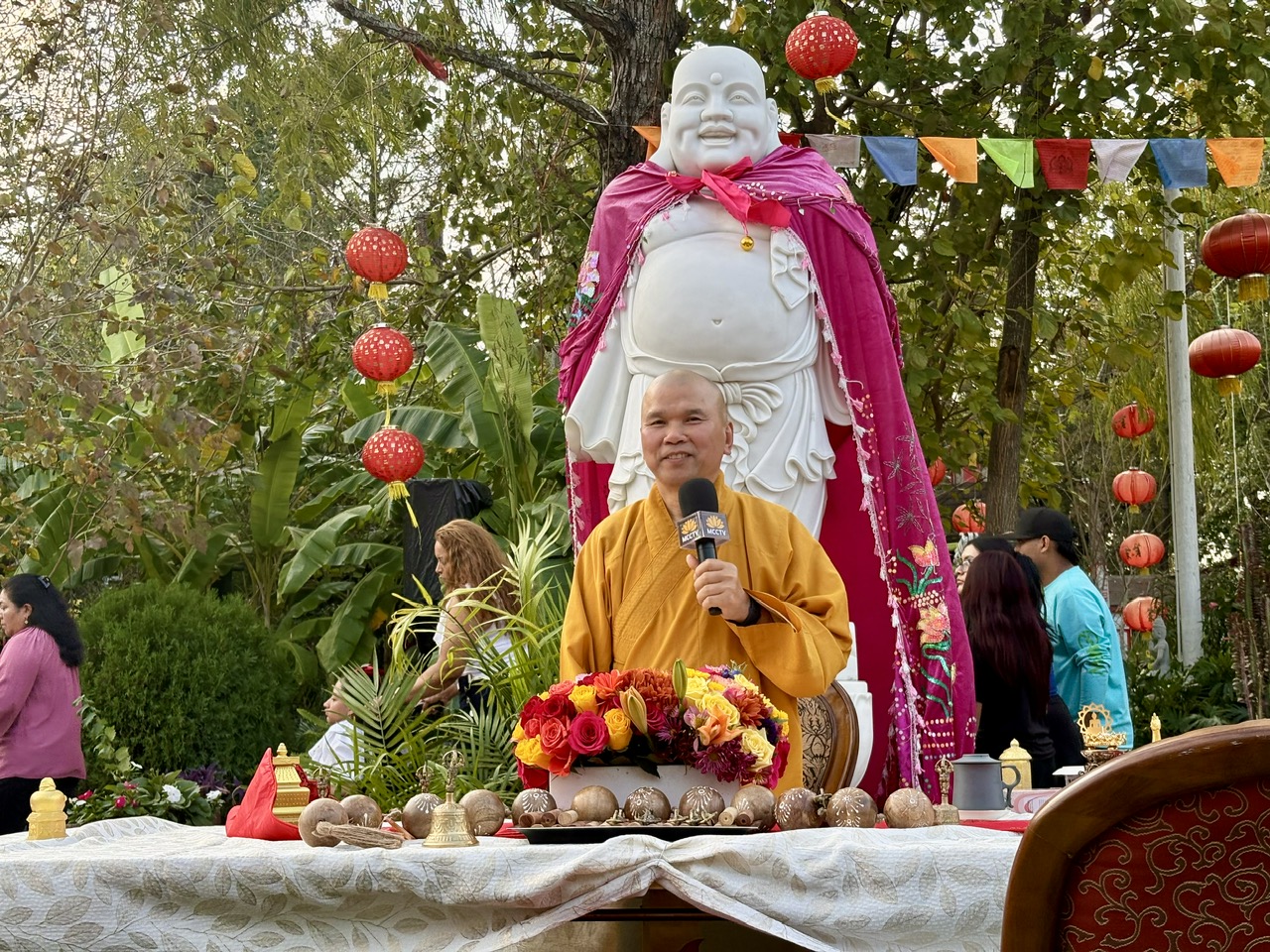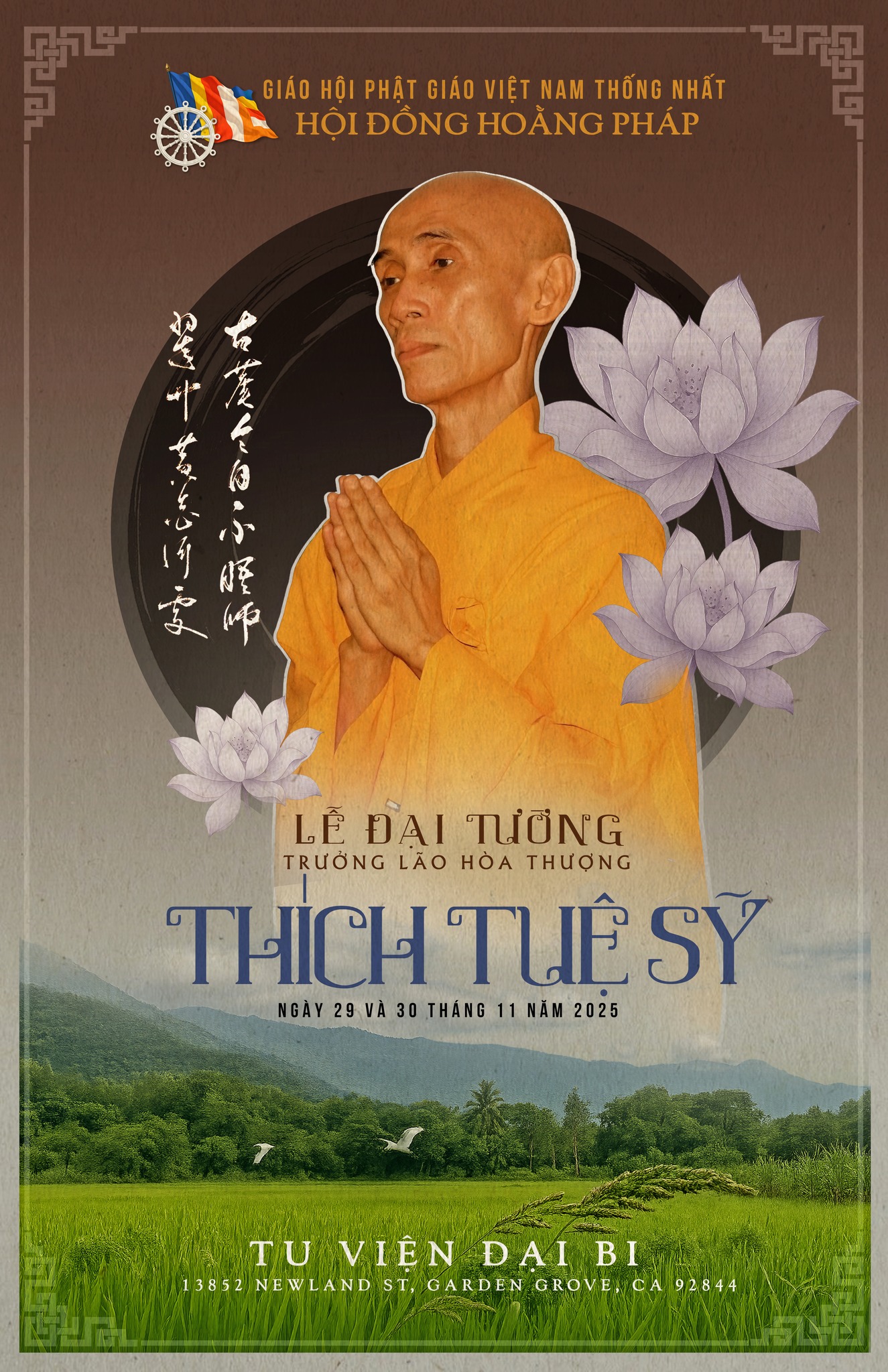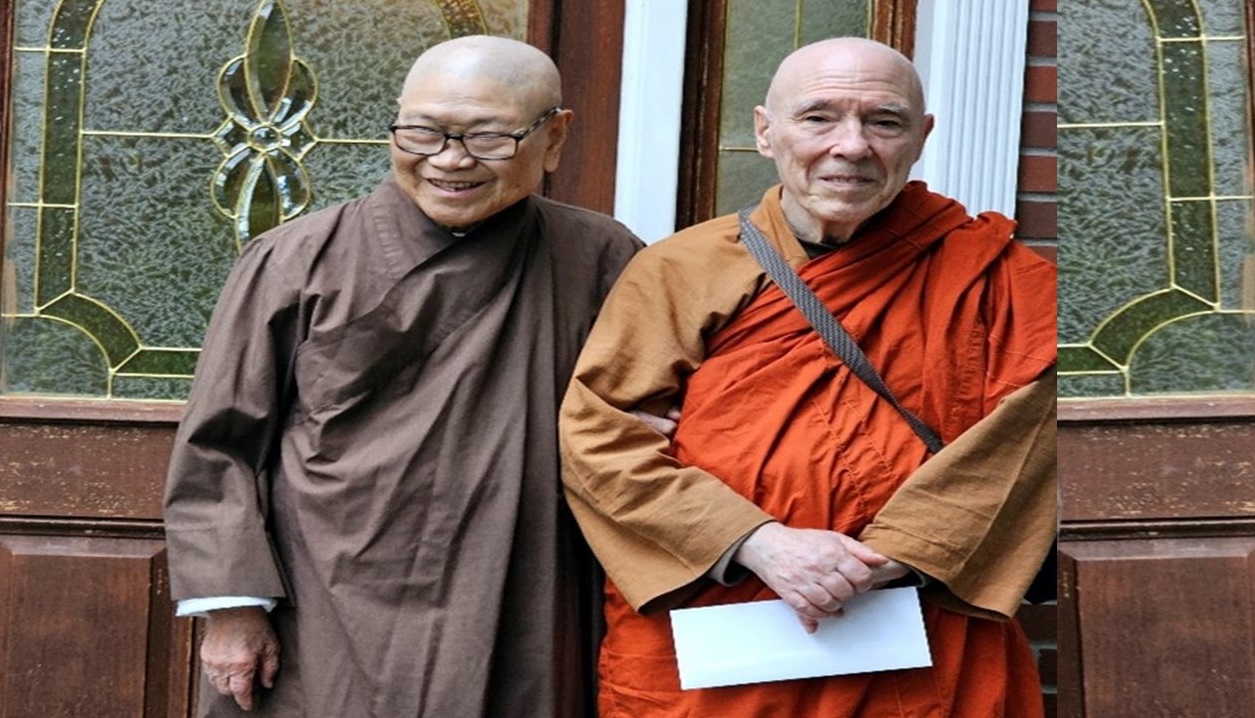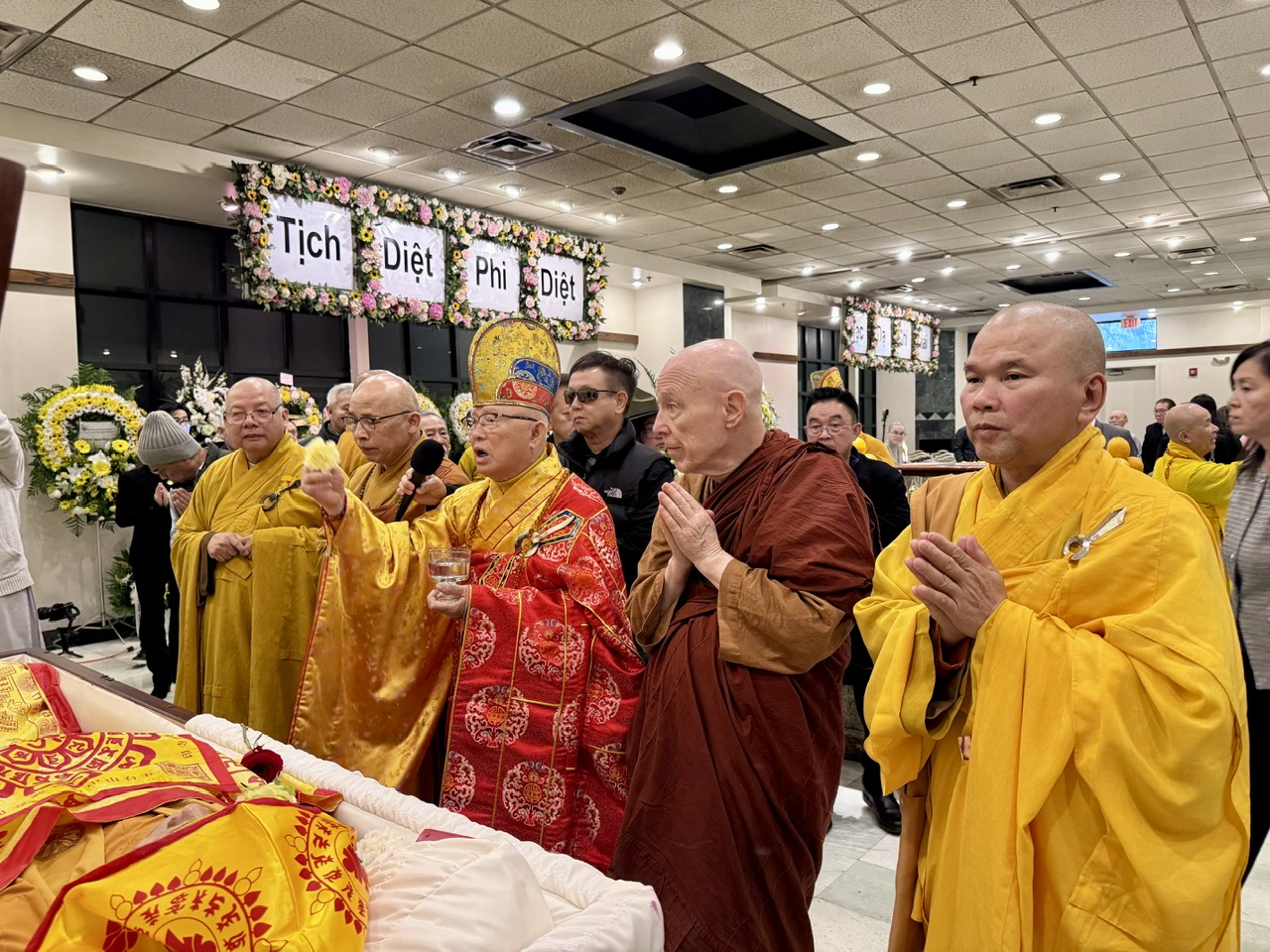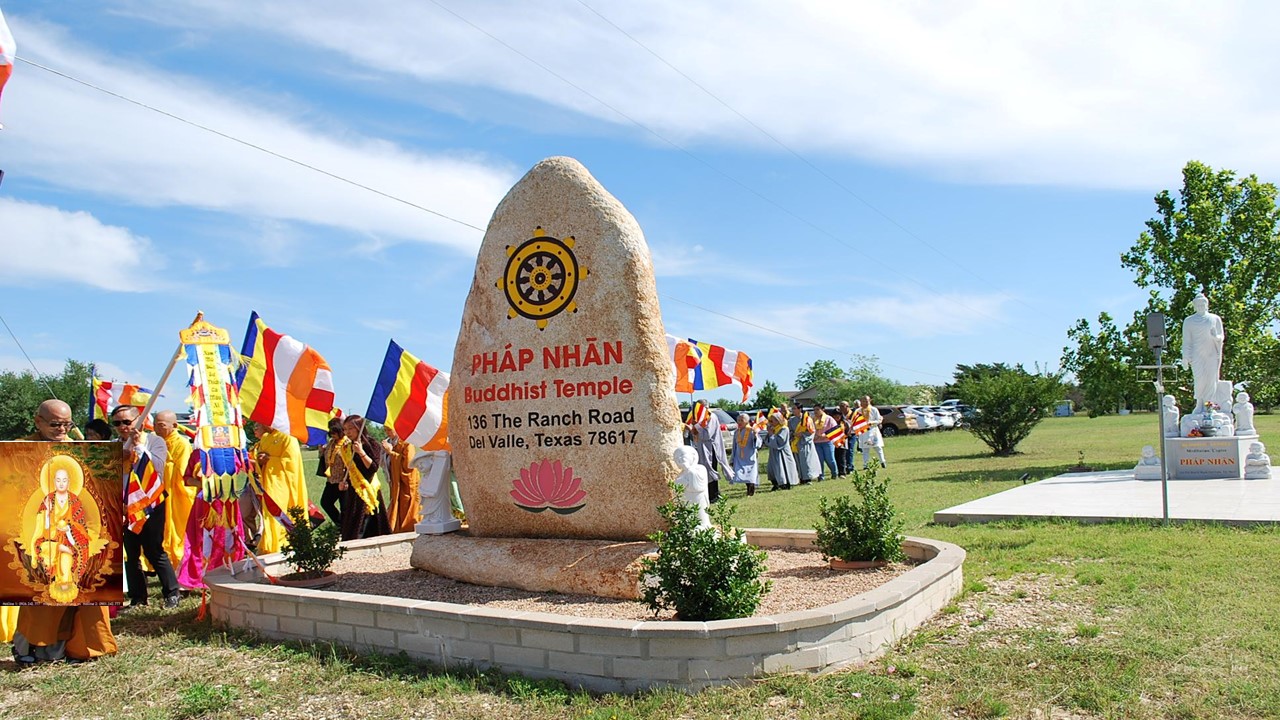
THIỆN SINH SUTRA CHANTING
Namo Tassa Bhagavato Arahato Samma SamBuddhassa
(3 times)
Respectfully pay homage to the Buddha: the World-Honored One, the Worthy One, the Exalted One, the Fully Awakened and Enlightened One. (Bell)
Praising the Buddha
As wonderful as the lotus flower,
as bright as the northern star,
let us come back and take refuge in
the Teacher gods and human beings.
The precious lotus blossoms on the enlightened pedestal
the halo shines in all directions.
Wisdom goes beyond the dharma realms,
Loving-kindness and compassion permeate all over the mountains and rivers.
I have just seen the Buddha’s perfect countenance,
My sincere heart wholeheartedly makes offerings to the Buddha,
I forward it to praise the Triple Gem
Diligence in the Dharma path is well cultivated.
Incense Offering
As the incense is lit,
sandalwood perfumes the air,
making an auspicious rainbow cloud.
I, disciple of the Buddha, with all my respect
offer my heart to the Buddhas of the Ten Directions.
May we practice the precepts seriously at all times
May we practice concentration diligently,
May we offer the precious fruit of insight as our offering of incense of the heart.
We would like to respectfully offer the incense of virtue, meditation, wisdom, deliverance, and deliverance with right understanding to the Buddha, Bodhisattvas, virtuous and noble Sangha, Dharma guardians, good gods, knowing and understanding our wholehearted minds. (Bell)
Respectfully Pay Homage to the Triple Gem
We, disciples of Gautama Buddha, take refuge in the Triple Gem
on the way of Dharma learning
know the Three Jewels of our own minds
vow to practice the Dharma diligently
in order to brighten the Three precious Jewels.
The Buddha who is the fully Awakened and Enlightened One
Shows the way of peace to living things and living beings,
Has the virtuous, good, and noble signs,
The Buddha’s wisdom and compassion are perfect.
We, disciples of Gautama Buddha, wholeheartedly pay homage to the Buddha forever present in the three lifetimes and ten directions. (One Prostration, Bell)
The Dharma that is the bright way,
Instructs people to escape the realm of delusion,
Leads us to return to true home
In order to live a life of awakening.
We, disciples of Gautama Buddha, wholeheartedly pay homage to the Dharma forever present in the three lifetimes and ten directions. (One Prostration, Bell)
The Sangha that is the beautiful Community in harmony
Travels on the joyful path together,
Cultivates to be freed from afflictions
In order to make life beautified.
We, disciples of Gautama Buddha, wholeheartedly pay homage to the Sangha forever present in the three lifetimes and ten directions. (One Prostration, Bell)
THIỆN SINH SUTRA CHANTING
Dīrghāgama, Part II, Sutra 16, and Dīgha Nikaya, Sutta 31.
By Ven. Thích Trừng Sỹ
Thus have I heard. On occasion, the Buddha was living at the Bamboo Forest Monastery, along with one thousand two hundred and fifty Monastics, put on yellow robes, carried alms bowls, and entered the Rājagaha City to collect alms. When they saw a young man Thiện Sinh, a householder’s son, every morning, obeying his father’s teachings, taking a shower, dressing neatly, putting his hands together to prostrate to the East, the West, the South, the North, the Zenith, and to the Nadir, the Buddha taught the young man thoughtfully about the meanings of the prostration to the six following directions:
1. The Eastern direction represents Parents and Children
I. Children’s duties
Listen, Thiện Sinh, to parents, children have the five duties:
1. Providing necessary material and spiritual needs for their parents. 2. Helping parents to do the hard jobs. 3. Protecting kinship dignity and family tradition. 4. Maintaining inheritable property. 5. Having the responsibility to look after funerals in accordance with the right Dharma when parents pass away.
II. Parents’ duties
To children, parents also have the five duties:
1. Teaching their children to do good, not to do evil. 2. Advising them to be close with experienced teachers, good friends, and wholesome environments. 3. Choosing the right careers for children. 4. Suggesting and helping children choose a suitable wife and husband. 5. Entrusting the inherited possessions and benefits to them in the proper and allotted time.
The prostration to the eastern direction in accordance with the Buddha’s teachings means children have their filial duties to support their parents and parents have the responsibility to bring up and educate their children to become talented and virtuous people. (O)
2. The Western direction represents wife and husband
III. Wife’s duties
Listen, Thiện Sinh, to the husband, whose wife has the five duties:
1. Taking care of neat and tidy housework. 2. Cordially welcoming friends and relatives of her husband’s family side. 3. Being faithful to her husband. 4. Maintaining wealth and properties both she and her husband earned. 5. Doing the domestic chores skillfully and quickly.
IV. Husband’s duties
To the wife, whose husband also has the five duties:
1. Loving his wife. 2. Learning the way to listen and say loving speech with her. 3. Having trust in her. 4. Knowing to buy birthday gifts for her. 5. Entrusting power and providing the necessary things for her.
The prostration to the western direction in accordance with the Buddha’s teachings means the husband and his wife, who live faithfully, know concessions, and have each other’s confidence to build happiness and warmness for their family. (O)
3. The Southern direction represents students and teachers
V. The Students’ duties
Listen, Thiện Sinh, to the teachers, students have the five duties:
1. Being respectful, polite, and willing to help the teachers to do the necessary things. 2. Knowing to obey the teachers’ teachings. 3. Knowing to listen and learn about the good and new things from the teacher. 4. Having to have the spirit of eagerly learning with teachers about something you do not know yet. 5. Knowing to practice, apply and create what you have learned.
VI. The Teachers’ duties
To the students, the teachers also have the five duties: 1. Teaching their students right view, right thought, right speech, right action, right livelihood, right effort, right mindfulness, right concentration. 2. Instructing creative and educational methods for students. 3. Do not hide knowledge, and wholeheartedly transmit knowledge and life experience to students. 4. Transmitting bodily teachings, verbal teachings, and mental teachings to students. 5. Expecting students to become talented and virtuous people and be better than teachers.
The prostration to the southern direction in accordance with the Buddha’s teachings means both teachers and students are virtuous and exemplary people knowing to transmit, connect, and apply Dharma knowledge as well as secular knowledge into their daily lives to benefit the many right in the present life. (O)
4. The Northern direction represents our duties to relatives and friends
VII. Our duties to relatives
Listen, Thiện Sinh, to our relatives, we have the five duties:
1. Advising relatives to do good. 2. Encouraging them to keep far away from evil. 3. Using the method of watering flowers to praise them. 4. Visiting them when they get sick. 5. Wholeheartedly helping them when they meet difficult and needy circumstances.
VIII. Our duties to friends
To friends, we also have the five duties:
1. Helping our friends when meeting difficulties. 2. Do not leave friends when they are in misfortune. 3. Playing with good friends who can help us succeed easily in life. 4. Advising them to stop and let go of the unwholesome things. 5. Communicating with friends in the spirit of dialogue, idea contribution, suggestion, joy, sympathy, and equality.
The prostration to the northern direction in accordance with the Buddha’s teachings means expressing your tolerant, close, lovely, and understanding heart with our relatives and friends. (O)
5. The Zenith represents lay devotees and monastics
IX. Lay devotees’ duties
Listen, Thiện Sinh, to monastics, lay devotees have the five duties:
1. Choosing the Triple Gem as the most stably spiritual refuge for their lives. 2. Learning, understanding, practicing, and applying the Five Ethical Trainings into daily life. 3. Skillfully expressing their good hearts to create merit, make offerings, and support the Three Jewels. 4. Do not idolize any individual monk or nun but consider all talented and virtuous monastics as your own Masters. 5. Knowing how to observe and select which teachings are good or not good, after bringing out to apply and practice those teachings, appropriate to the teachings of cause and effect and to the many right in the present life, you should practice them, and vice versa, you should keep far away from them.
X. Monastics’ duties
To lay devotees, monastics have the five duties:
1. Instructing the Five Ethical Trainings and the Noble Eightfold Path for lay devotees. 2. Instructing Dharma Learning and Dharma Practice; Dharma Learning includes Virtue, Concentration, and Wisdom; Dharma Practice includes Samatha Meditation and Vipassana Meditation. 3. Instructing lay devotees to express their hearts joyfully before making offerings, joyfully during making offerings, and joyfully after making offerings. 4. Instructing lay devotees to hold the right and stable confidences in the Three Jewels. 5. Instructing lay devotees to learn the ways of practicing recollection of gratitude to the Buddha, the Dharma, and to the Sangha.
The prostration to the Zenith in accordance with the Buddha’s teachings means both lay devotees and monastics are determined to learn, understand, cultivate, and apply the Buddha Dharma into their daily lives to bring the flowers and fruits of peacefulness and happiness for the many right in the present life. The Dharma protection and the Dharma propagation between lay devotees and monastics connect together very closely. (O)
6. The Nadir represents employees and managers
XI. Employees’ duties
Listen, Thiện Sinh, to managers, employees have the five duties: 1. Going to work early and punctually. 2. Having the responsibility to finish employment when assigned. 3. Doing orderly, neat, tidy, methodical, and mindful employment. 4. Aware to protect general property and not to steal. 5. Respecting, esteeming, and protecting prestige and dignity for managers.
XII. Managers’ duties
To employees, managers also have the five duties: 1. Entrusting proper employment with the ability and degree for employees. 2. Providing suitable salary or food for employees. 3. Taking care and greeting thoughtfully when employees get sick. 4. Rewarding, disciplining, and appreciating the excellent and non-excellent achievements of employees. 5. Giving employees a suitable vacation.
The Prostration to the Nadir in accordance with the Buddha’s teachings means managers and employees always have mutual duties and responsibilities for both material and spirituality to develop their company well. (O)
The Six Directions were taught above, the Buddha thoughtfully advised young man Thiện Sinh the essential things through the summarized versa as follows:
Parents are the East
Teachers are the South
Wife and husband are the West
Relatives are the North
Employees are the Nadir
Monastics are the Zenith
Exemplary practitioners
Pay prostration to those directions.
When living in happiness
When dying in peacefulness
Wise people cultivating so
Live for themselves and for other people
Always bring benefits
For all people in the world.
On the way of cultivation
Relying on wholesome friends
Learning and following virtuous people
Bringing benefits for living beings.
Living in the world
We know to do good
Advising people to do good
Peace always increases.
True Buddhist people
do something wholesome,
think about something wholesome,
say something wholesome,
their bodies and minds are regularly at peace. (O)
Practitioners go into life
As flowers blossom everywhere
Solemnly and freely
To make life joyful and peaceful.
As bees going to seek flowers
Cling to a flower to suck its nectar
Finish sucking it and flying away,
but the flower remains undamaged.
Diligently protecting the Dharma
Diligently supporting the Sangha
Making offerings to the Worthy One
being the field of the topmost virtue.
The above-mentioned things
Practitioners always accomplish,
their merit and virtue get bigger and bigger
as river water flows down into the ocean. (O)
The six directions above taught by the Buddha are the six ethical and educational relationships interconnecting together very closely between families, schools, and societies, containing the values of humanities, engaged life, cause, effect, duties, and responsibilities so deeply, and helping everyone be aware to live in peace and happiness for oneself and for other people right in the present life. The Buddha’s teachings have many pragmatic and surpassing meanings beyond space and time.
Whether living anywhere, or any country in the world, if all people skillfully apply the Thiện Sinh Sutra in their daily lives in the right place, at the right time, and on the right object, certainly they will bring a lot of the substances of cultivation, peacefulness, and happiness for many people.
After having listened to the Buddha’s teachings, the young man Thiện Sinh was extremely happy to respectfully pay homage to the Buddha, and spoke out the meaningful, praiseful, reverential, and metaphorical words as follows:
“How wonderful it is, respectfully dear the World-Honored One! How marvelous it is, respectfully dear the Exalted One! The Dharma skillfully proclaimed by the Buddha himself is very practical, present, specific, and clear, has penetrated deeply into my heart, makes my mind softer, gentler, and better. The Buddha dharma has opened my mind suddenly brighten up, as a person who erects upright what is fallen down turns face upward what is overturned, opens out what is closed secretly, reveals what is hidden, shows the way to those who are lost, carries light into the darkness so that those who have eyes can see visible objects in detail, as a person who goes in the dark night meets light, as a blind person, whose eyes get brightened. By many skillful methods of teaching, the World-Honored One helps me to see everything clearly like daylight.” (O)
May the World-Honored One regard and accept me as the lay devotee. From now until my whole life, I am determined to take refuge in the Buddha, the Dharma, and the Sangha, and committed to cultivating the five Ethical Trainings fully:
1. Respecting lives, developing loving-kindness and compassion, protecting the natural environment, and nourishing inner peace by being aware not to kill living beings.
2. Letting go of the stingy and greedy mind, expressing the mind of almsgivings, making offerings, and protecting the Triple Gem by being aware not to take what is not given.
3. Building happiness for the family, living faithfully with a legal spouse by being aware not to do sexual misconduct, adultery, and not to violate kids’ sexuality.
4. Saying the true, harmonious, and loving speech, bringing mutual trust and prestige by being aware not to tell lies.
5. Protecting vigorous health, lucid mind, bringing peacefulness and happiness for families, schools, and societies by being aware not to take alcohol, drugs, including smoking, gambling, and playing violent video games online.
When aware to keep far away from these toxins, Dharma learning, Dharma practice, Dharma joy, and Dharma happiness have the ability to permeate and cool my body and mind. When officially becoming the Buddha’s well-trained devotee, the young man Thiện Sinh is extremely happy to hold stable confidence in taking refuge in the Triple Gem, applying, and cultivating the Buddha Dharma in his daily life to bring benefits and happiness to living things and living beings all over the planet.”
Namo the Original Master Sakyamuni Buddhaya
(3 times, Bell)
The Heart Sutra of Insight that Brings Us to the Other Shore
Avalokiteshvara, while practicing deeply with the insight that brings us to the other shore, suddenly discovered that all of the five Skandhas are equally empty. After this penetration, he overcame all ill-being. “Listen, Sariputra, this body itself is emptiness, and emptiness itself is this body. This body is not other than emptiness, and emptiness is not other than this body. The same is true of feelings, perceptions, mental formations, and consciousness.
Listen, Sariputra, all phenomena bear the mark of emptiness; their true nature is the nature of no Birth no Death, no Being no Non-being, no Defilement no Immaculacy, no Increasing no Decreasing.
That is why in emptiness, body, feelings, perceptions, mental formations and consciousness are not separate self-entities. The Eighteen Realms of Phenomena which are the six Sense Organs, the six Sense Objects, and the six kinds of Consciousness are also not separate self-entities.
The Twelve Links of Interdependent Arising and their extinction are also not separate self-entities. Ill-being, the Causes of Ill-being, the End of Ill-being, the Path, insight, and attainment, are also not separate self-entities. Whoever can see this no longer needs anything to attain. (Bell)
Bodhisattvas who practice the Insight that brings us to the other shore see no more obstacles in their mind, and because there are no more obstacles in their mind, they can overcome all fear, destroy all wrong perceptions and realize Perfect Nirvana.
All Buddhas in the past, present and future by practicing the insight that brings us to the other shore are all capable of attaining authentic and perfect enlightenment. Therefore, Sariputra, it should be known that the insight that brings us to the other shore is a Great Mantra, the most illuminating mantra, the highest mantra, a mantra beyond compare, the true wisdom that has the power to put an end to all kinds of suffering. Therefore, let us proclaim a mantra to praise the Insight that Brings Us to the Other Shore.
“Gate, gate, pāragate, pārasamgate, bodhi, svaha.”
(3 times, Bell)
Gone, gone, well gone, gone beyond the other shore, got enlightenment so happily.
(3 times, Bell)
THE THREE REFUGES
I take refuge in the Buddha, the One who shows me the way of loving-kindness, compassion, and wisdom in my lifetime.
Having taken refuge in the Buddha, I clearly see the path of light and beauty in life.
Turning back and taking refuge in the Buddha in myself, I aspire to help all people soon recognize and develop their own enlightened nature.
Namo Buddhaya
Buddhaṃ saraṇaṃ gacchāmi
Dutiyampi buddhaṃ saraṇaṃ gacchāmi.
Tatiyampi buddhaṃ saraṇaṃ gacchāmi. (Bell)
I take refuge in the Dharma, the way of practicing peace, joy, happiness, understanding, and love for the many right in the present life.
Having taken refuge in the Dharma, I am learning and practicing the Noble Eightfold Path including virtue, meditation, and wisdom interconnected very closely with right view, right thought, right speech, right action, right livelihood, right effort, right mindfulness, and right concentration.
Turning back and taking refuge in the Dharma in myself, I aspire to help all people fully master the ways of practice and walk together on the path of liberation.
Namo Dharmaya
Dhammaṃ saraṇaṃ gacchāmi.
Dutiyampi dhammaṃ saraṇaṃ gacchāmi.
Tatiyampi dhammaṃ saraṇaṃ gacchāmi. (Bell)
I take refuge in the Sangha, the Community of cultivated people who vow to lead their lives of ethics, harmony, and awareness to themselves and to others right here and right now in the present life.
Having taken refuge in the Sangha, I am enlightened, instructed, and supported by the Sanghabody on the way of practice.
Turning back and taking refuge in the Sangha in myself, I aspire to help all people build fourfold Communities, to embrace all beings, and support their transformation.
Namo Sanghaya.
Saṅghaṃ saraṇaṃ gacchāmi.
Dutiyampi saṅghaṃ saraṇaṃ gacchāmi.
Tatiyampi saṅghaṃ saraṇaṃ gacchāmi. (Bell)
Sharing the merit
Reciting the trainings, practicing the way of awareness gives rise to benefits without limit. We vow to share the fruits with all beings. We vow to offer tribute to parents, teachers, friends, and numerous beings who give guidance and support along the path. May the merit of this practice benefit all beings and bring peace. (Bell)
Express diligent vows and pay thankful respects to the Triple Gem
We, disciples of Gautama Buddha, are always aware of ourselves by day and by night, constantly practice and recollect the light of the Buddha. Namo Buddhaya.
(Bell, one prostration)
We, disciples of Gautama Buddha, are always aware of ourselves by day and by night, constantly practice and recollect the light of the Dharma. Namo Dharmaya.
(Bell, one prostration)
We, disciples of Gautama Buddha, are always aware of ourselves by day and by night, constantly practice and recollect the light of the Sangha. Namo Sanghaya.
(Bell, one prostration)
May we be well,
May we be happy
May we be healthy
May we be peaceful
May we be free from suffering, greed, anger, delusion, hatred, violence, and ignorance.
May the Buddha and Bodhisattvas bless and protect all anytime and anywhere.
Sadhu, lành thay, well-done, and Excellence.
Namo Buddhaya
Namo Dharmaya
Namo Sanghaya.
(Bell, Bell, Bell)
Compiled and translated by Ven. Thích Trừng Sỹ



